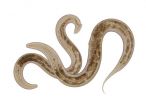Do you have the time? Flies sure do
2015-05-28
(Press-News.org) Flies might be smarter than you think. According to research reported in the Cell Press journal Current Biology on May 28, fruit flies know what time of day it is. What's more, the insects can learn to connect different scents with the sweet reward of sugar, depending on the hour: menthol in the morning and mushrooms in the afternoon.
Researchers say that the findings show the surprising mental abilities of animals, no matter how small.
"If even the fly, with its miniature brain, has the sense of time, most animals may have it," says Martin Heisenberg of Rudolf Virchow Center in Germany.
In earlier studies, researchers showed that mice and honeybees can associate a reward--food or a mate, for instance--with a particular time of day. To understand how this memory for time works in the new study, Heisenberg and his colleagues looked to the fruit fly.
The researchers trained hungry flies to associated two different chemical odors with sugar in the morning or in the afternoon on two consecutive days. On the third day, they tested the flies' preference for one scent or the other.
The results were clear: the flies learned to switch their scent preference over the course of the day. Flies tested in the morning preferred the odor paired during training with sucrose in the morning, while flies tested in the afternoon preferred the odor paired with sucrose in the afternoon. Their ability to tell time remained as long as the two separate events were separated by a period of at least four hours.
The researchers found that the flies' time-keeping ability remained both in constant darkness and with a regular light-dark cycle. The flies couldn't keep time, however, when the lights were kept on around the clock. Flies lacking clock genes known to be important for maintaining a daily circadian rhythm still learned to like certain odors, but they couldn't associate those scents with the time.
The findings show that flies can use time as an additional clue to find what's good to eat. The next step is to explore the underlying molecular mechanism for this time-odor learning in greater detail.
"Given the formidable collection of genetic tools for studying the fly brain, this can now be achieved," Heisenberg says.
INFORMATION:
Current Biology, Chouhan et al.: "Flies remember the time of day" http://dx.doi.org/10.1016/j.cub.2015.04.03
Current Biology, published by Cell Press, is a bimonthly journal that features papers across all areas of biology. Current Biology strives to foster communication across fields of biology, both by publishing important findings of general interest and through highly accessible front matter for non-specialists. For more information please visit http://www.cell.com/current-biology. To receive media alerts for Current Biology or other Cell Press journals, contactpress@cell.com.
ELSE PRESS RELEASES FROM THIS DATE:
2015-05-28
Controlling bacterial infections responsible for typhoid fever could dramatically reduce the risk of gallbladder cancer in India and Pakistan, according to a study published by Cell Press May 28th in Cell Host & Microbe. The findings establish for the first time the causal link between bacterial infection and gallbladder cancer, explaining why this type of cancer is rare in the West but common in India and Pakistan, where typhoid fever is endemic. Public policy changes inspired by this research could have an immediate impact on preventing a type of cancer that currently ...
2015-05-28
The chemical rapamycin is used clinically as an immunosuppressant and as an anti-cancer agent that works by inactivating a protein named TOR (Target Of Rapamycin). This protein is essential for the growth of normal cells, but is hyperactive in tumor cells. To be able to carry out its various growth-related tasks, TOR needs to assemble into one of two larger protein complexes named TORC1 and TORC2. Curiously, whereas TORC1 is inhibited by rapamycin, TORC2 is unaffected by this drug. The team of Robbie Loewith, professor in biology at the University of Geneva (UNIGE), Switzerland, ...
2015-05-28
DURHAM, N.C. -- Duke Medicine researchers have found that bladder cells have a highly effective way to combat E. coli bacteria that cause urinary tract infections (UTIs).
In a study published online May 28, 2015, in the journal Cell, Duke researchers and their colleagues describe how bladder cells can physically eject the UTI-causing bacteria that manage to invade the host cell.
This response is analogous to having indigestion and vomiting to rid the stomach of harmful substances.
The finding suggests there may be a potential way to capitalize on this natural tendency ...
2015-05-28
New research suggests that European and Asian (Eurasian) peoples originated when early Africans moved north - through the region that is now Egypt - to expand into the rest of the world. The findings, published in the American Journal of Human Genetics, answer a long-standing question as to whether early humans emerged from Africa by a route via Egypt, or via Ethiopia.
The extensive public catalogue of the genetic diversity in Ethiopian and Egyptian populations developed for the project also now provides a valuable, freely available, reference panel for future medical ...
2015-05-28
CAMBRIDGE, MA -- Some decisions arouse far more anxiety than others. Among the most anxiety-provoking are those that involve options with both positive and negative elements, such choosing to take a higher-paying job in a city far from family and friends, versus choosing to stay put with less pay.
MIT researchers have now identified a neural circuit that appears to underlie decision-making in this type of situation, which is known as approach-avoidance conflict. The findings could help researchers to discover new ways to treat psychiatric disorders that feature impaired ...
2015-05-28
La Jolla, Calif., May 28, 2015 - A new collaborative study led by researchers at Sanford-Burnham Medical Research Institute (Sanford-Burnham), published today in Cell Reports, provides new insight into the molecular changes that lead to resistance to a commonly prescribed group of drugs called BRAF inhibitors. The findings suggest that targeting newly discovered pathways could be an effective approach to improving the clinical outcome of patients with BRAF inhibitor-resistant melanoma tumors.
Melanoma is the deadliest form of skin cancer, killing more than 8,000 people ...
2015-05-28
This news release is available in French.
One night of poor sleep significantly decreases performance on intelligence tests in children with autism spectrum disorder (ASD) and also in neurotypical children (without ASD). This is the conclusion made by researchers at the Hôpital Rivière-des-Prairies, affiliated with the Institut universitaire en santé mentale de Montréal and Université de Montréal.
For a paper published in the International Journal of Psychophysiology, the researchers observed the EEG measures of 13 autistic children ...
2015-05-28
Ex-prisoners with a history of risky drug use, mental illness or poverty are more likely to end up back behind bars. Those who are obese, are chronically ill or have attempted suicide are more likely to remain in the community. These are some of the findings from an exploratory study into health-related factors that could be used to predict whether a person released from prison will end up in custody again. It was led by Emma Thomas of the University of Melbourne in Australia and is published in Springer's journal Health & Justice, an open access journal.
In many countries, ...
2015-05-28
A citizen science programme reveals the protection measures for the Montagu's harrier in the cereal crop season in France to be ineffective if nests are not protected to decrease predation after harvesting. A study has been published as a result of this voluntary fieldwork, with the participation of the Hunting Resources Research Institute, which proposes fencing off the nests as a way of mitigating the damage and optimising conservation efforts in different areas.
Over the last decade there has been an explosion in the so-called citizen science programmes, in which people ...
2015-05-28
EUGENE, Ore. -- (May 28, 2015) -- Men and women often enter relationships with different long-term goals. In the animal world, differences in approaches to reproductive success can lead to sexual conflict.
Male fruit flies, for example, transfer proteins during mating that can alter the timing of a female's egg laying and her tendency to later mate with other males. Some of these male-derived proteins also migrate from the female's reproductive tract to her brain.
Now, in a new study, scientists of the University of Oregon and Bowdoin College show that sexual conflicts ...
LAST 30 PRESS RELEASES:
[Press-News.org] Do you have the time? Flies sure do



